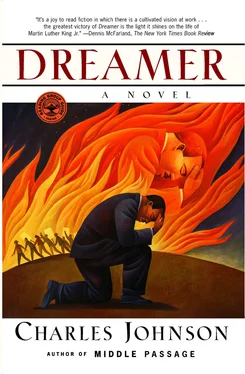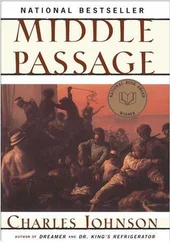I was shaking too badly to drive. And I felt ashamed, as if I’d failed the minister, my mother, myself. I gave Smith my keys — his smile mashed his cheeks up in parallel moons — and within a few minutes we were back on the highway, heading farther south. For the longest time I sat with my hands squeezed between my knees, my fists clenched, afraid that at any moment I’d see in the rearview mirror a highway patrol car pulling up behind us, yet I felt exhilarated by what I’d done.
Smith kept grinning at me, happily patting out rhythms on the steering wheel with his palms. “You all right.” He reached over and patted my shoulder. “With a li’l more work, you gonna love it where I live.”
There were many times when he wondered if he was wrong.
Sitting by the window in the second row of first-class seats, all the others empty at this hour, on the predawn flight that shuttled him back and forth between Chicago and Atlanta, where he was determined to earn his $6,000-a-year salary by delivering a sermon each Sunday, he thought back to the astonishing victories granted him by the Lord of Love, and forward to the November retreat planned for his staff at which time he felt he should remind them how he was still searching and did not have all the answers. Nonviolence, he felt, was an experiment with truth. It was a truth-seeking process. That was all in this world he could say with certainty …
It was four-thirty in the morning. The engines of the airplane roared around him as it tore down the runway, shaking loose poorly secured doors on the overhead compartments and, behind him, throwing dishes to the floor in the tiny cubicle that served as a galley. That so much metal could even leave the ground and stay airborne always startled and delighted him (and in single-engine planes, in which he refused to ride, terrified him). Airplanes piqued his anagogic and analogical side, the old student of Aquinas who enjoyed reasoning vertically from the natural world toward heaven, which these flying machines came close to bumping into. Unconsciously he pressed his feet forward under the seat in front of him to keep his small black suitcase from sliding into the aisle, though if it spilled open there would be little to retrieve because he felt best when he traveled light with as little baggage as possible, physical and metaphysical. Toward the front of the plane, beneath the red FASTEN SEAT BELTS and NO SMOKING signs, the black stewardess who’d brought coffee and a pillow and fussed over him when he boarded was strapping herself into a bucket seat that folded out of the wall. She’d told him her name was Stephanie. An Alabaman raised to value the goodwill and hospitality that was so much a part of his own upbringing, she’d asked for his autograph and couldn’t do enough for him. Apparently, she’d seen his name on the passenger list, then rushed out and purchased forty copies of Stride Toward Freedom, inserting in each one the inscription she wanted him to write for her family and friends. “I hope you won’t mind,” she’d said. He saw the cardboard box of books at her feet, and sighed. All he wanted to do was work on his sermon and nap before they arrived in Atlanta. She couldn’t know how sensitive he was about people fawning over him, or how every worldly honor he received (he had more medals than a Russian general) threw him into the deepest reflection on whether he deserved these distinctions and if one day they’d prove to be more weight than they were worth. Glorifying any man was a sin. But he accepted the honors so as not to offend. People sent him photos of their newborns named after him, their wedding snapshots, and constantly wrote him requests for his autographed portrait. Always he or someone on his staff responded. After his trip to India he’d vowed to set aside one day a week for fasting and meditation, and to spend more time in study — he was certain he needed these things to be a better leader. Yet there never seemed to be enough time to keep those vows … Their eyes caught across the cabin. Stephanie was smiling at him again, then she winked and looked back at the clipboard on her lap.
Suddenly he felt warm. With two fingers he pulled loose the tight knot of his tie, undid the top button on his shirt, then pushed up the window’s stiff curtain at his right, peering down at blinking lights on the plane’s silvery deltoid wing, and beyond that to the waters of Lake Michigan. The sun, huge and liquid, hung over the horizon. From this height waves wimpling the blue surface looked frozen, as if someone had called time out on all motion in the world below, and the Wheel of Life stopped to give everyone time to catch his breath. And then he could see nothing as the plane began its steep ascent to thirty-five thousand feet — he only knew they were rising to that altitude because the pilot, a southerner by his accent, came on over the crackling loudspeaker to tell passengers his flight plan and the temperature in Atlanta and to report that their crew had a combined total of fifty thousand hours in the air. Somehow the pilot’s voice and experience put him at ease. Or maybe it was the vulnerability he felt whenever he flew, knowing that someone he couldn’t see or talk to had control over his destination and whether he lived or died, and most likely that person was trustworthy since his own life depended on doing his job well. It wasn’t easy to be an atheist on an airplane. No sooner had you strapped in than you had to believe in something beyond yourself. Perhaps there was a sermon here, an exemplum he might use on Sunday. But no, afterward someone would pick it apart, like the monk Gaunilo shredding Anselm’s proof for God’s existence. It was too whimsical. Yet in a small way it reminded him of that terrible night in Montgomery when his faith, lukewarm since childhood, became real.
Everyone in Atlanta expected the son of the city’s most influential pastor would be eager to join the church. The truth was that when he was seven, doing so was the farthest thing from his mind. But during Ebenezer’s annual two-week revival in May of 1936, his sister boldly stepped forward for baptism, and this stung him sorely, the thought that Christine might get a leg up on him in anything. Halfheartedly he submitted to the ritual. But even then some critical, questioning part of him stood back, skeptical, watching himself from a distance, and mocking him a little because not only had the “crisis moment” associated with conversion eluded him but he could not square the over-the-top emotionalism of the fundamentalist Baptist church — talking in tongues and flailing on the floor when “getting happy”—with his preference for coolly and deliberately thinking things through.
Sometimes he felt at odds with others at Ebenezer. His Sunday-school teachers had little education to speak of. Nevertheless, they believed. Although none had heard of biblical hermeneutics, each old deacon and assistant pastor had been saved in that revered and awful (to him) moment of epilepsy and seizure so many said lay in wait one day for him. He told no one how that prediction cut him off at the knees after he saw a light-skinned girl from Booker T. Washington High School, one he’d been attracted to, struck down by the spirit in his father’s church. Lightning seemed to single her out from the other parishioners fanning themselves and singing one of his favorite hymns, “Honor, Honor”—she was adance in the seat beside her startled mother, then it lifted her like a broken doll and flung her helplessly to the hard wooden floor. Her eyes turned up in her head. Veins in her throat stood out. There was the possibility she might swallow her tongue, and that frightened him all the more and made his heart leap in his chest. He watched her wide-eyed, squeezing his hands together, as she kicked the air and tore loose her clothing, as unconscious of her nakedness as someone in one of the ancient, pre-Christian mystery cults. For months she’d ignored him. She’d been haughty, distant, in control. Now she writhed on the floor like a worm. Water ran down her legs. Her light cotton dress rose above her brown thighs, giving him an eyeful of what he’d fantasized about all summer long before the girl’s mother shoved her garments down. His own mother spun him back around in his seat. Watching the girl had aroused him. Biting down hard on his knuckles, he felt burning shame shot through with the wound of desire. Spiritual hunger and sexual longing simultaneously. He closed his eyes, praying that his voyeurism, like that of Ham, had not offended the god thunderously unleashed inside the girl, yet if this violent seizure was what it meant to be saved, he hoped it would never happen to him.
Читать дальше












